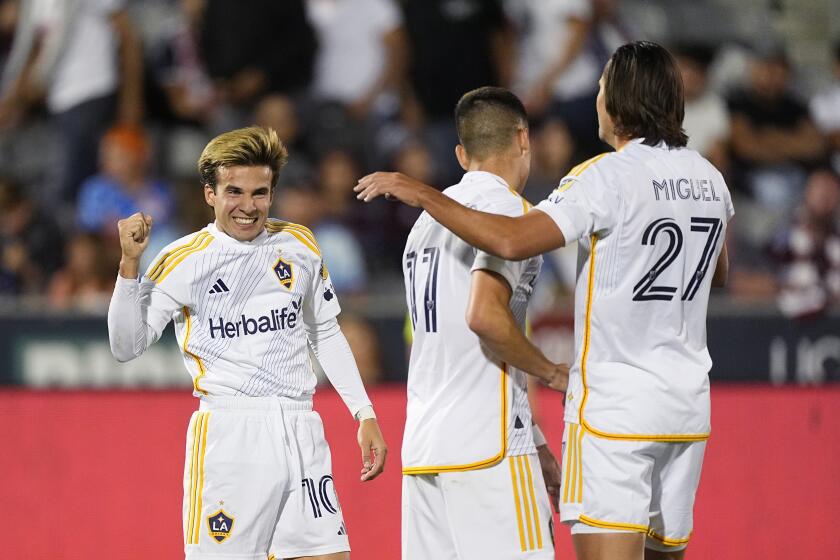TACOMA’S DEFENSE : Stars Make a Mission of Protecting the Goal
SAN DIEGO — The Tacoma Stars have turned blocked shots into an art form.
“If the ball hits our guys in the face,” said Star goalkeeper Joe Papaleo, “they’ll take it.”
Actually, they’ll have accomplished their mission.
“Everybody has to throw their body in there,” said Alan Hinton, Tacoma Stars coach. “It’s like, if I’m going to risk my body, you’ve got to do the same thing. (Neil) Megson set the standards. (Joe) Waters got in the act. (Val) Tuksa got in the spirit of it. There’s almost a competition among themselves.”
In a sport in which defenders are usually viewed as little more than obstacles to high-scoring games, the Stars have turned defense into a positive statistic. Into a record-setting statistic.
During the regular season, the Stars blocked a Major Indoor Soccer League-record 753 shots. That’s 14.5 blocked shots a game and 102 more than the Cleveland Force had in 1983-84, when they set the previous record. And it’s almost twice as many blocks as the Sockers (382 blocks) had this season.
Tacoma was the first team to have three players block more than 100 shots in a season. And they had six other players with more than 20 blocks.
Megson, a Western Division all-star, was second in the league with 134 blocks in 45 games, trailing Bernie James of Cleveland, who had 139 blocks in 49 games. Ralph Black was sixth in the league with 110 blocks, Waters was seventh with 109 blocks and Tuksa was 11th with 93 blocks. By comparison, Kevin Crow led the Sockers with 101 blocks, which was 53 more than runner-up Brian Schmetzer.
“If one guy gets a good block it motivates everyone else,” Megson said. “When we’re blocking shots, we’re playing well.”
The Stars blocked 20 shots in their 7-2 victory over the Sockers in Game 2 of the Western Division finals. They had 16 blocks in their 3-2 victory in Game 3 Wednesday night at the Sports Arena.
Blocked shots are a combination of good timing, favorable rulings by the home team scorers (like assists in basketball) and a lack of respect for one’s body.
“This is a bloody brave team,” Hinton said. “Roll your sleeves (up) and work hard. If you get hurt while going for the ball, we’ll take care of you.”
But they didn’t get hurt much. Gregg Blasingame, Bill Crook, Waters and Tuksa played in all 52 regular-season games and Megson and Black in 45 each. And almost incredibly, the Stars were the second least penalized team in the league with 91 penalties for 185 minutes (3.6 minutes a game). Minnesota led the league with only 2.9 minutes a game.
“We play physical every game,” Megson said. “We try to intimidate players and put them under pressure.”
And they never let up. They are divers, scrappers, tacklers. And they are young. Megson is 24 and Crook, Black and Blasingame are 23. Waters is 33, but is coming off what Hinton calls a “great season.” Tuksa, acquired as a free agent before the season, is the stabilizing force at 36.
While Megson, Black and Waters do most of the shot blocking, Blasingame is the designated runner. Blasingame and Socker defender Fernando Clavijo are considered the two fastest players in the MISL. Blasingame, son of former major league baseball player Don Blasingame, blocked 48 shots this season, but he’s known more for his 4.2 speed in the 40-meters.
“Last year, we were a good team,” Blasingame said, “but a little short. Everybody wasn’t that confident. This year, we’re contenders.”
Last year, the Stars blocked only 471 shots. This year, with the addition of Tuksa, and with Hinton and Steve Zungul with the Stars for a full season, the Stars concentrated more on defense. They also got solid goalkeeping from Joe Papaleo, Peter Mowlik and Mike Dowler and allowed just 211 goals (fifth in the league), compared to 232 last season.
The Stars had the best record in the league this season (35-17) and hold a 2-1 lead in their best-of-seven series against the Sockers. Game 4 is at 7:35 tonight at the San Diego Sports Arena.
After the Stars’ victory Wednesday night, many of the Sockers were saying that the Stars were outworking them, were too physical for them and were frustrating them defensively. San Diego scored only two first-half goals in Game 2 and two goals--on a shoot out by Branko Segota and 30-footer by defender Kevin Crow--in Game 3.
“San Diego is the best fast-breaking team in the league,” Megson said. “We’ve tried to get organized at the back, to take the fast break away from them.”
And they’ve continued blocking shots at an amazing pace.






